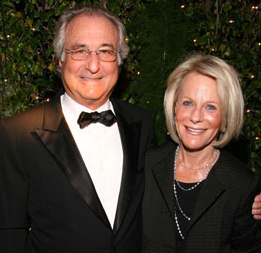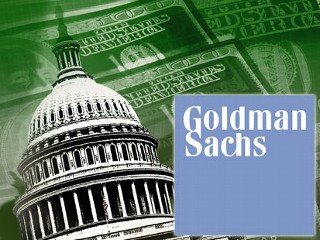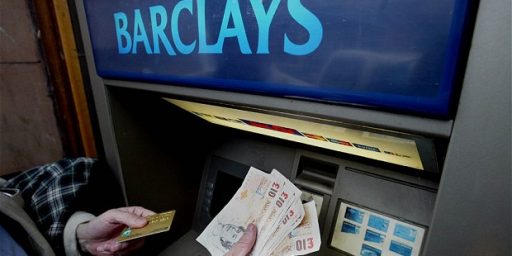Madoff and His Ponzi Scheme
I guess it isn’t surprising that the greedy and gullible still fall for this scheme, but this one is rather amazing in its sheer size.
Investors around the world are counting the spiralling cost of the biggest fraud in history, a $50bn scam that has ensnared billionaire businessmen and tiny charities alike and whose tentacles have stretched further and deeper than anyone imagined.
The fallout from the arrest of the Wall Street grandee Bernard Madoff was continuing to grow last night, as institution after institution detailed the extent of their possible losses, and the victims in the UK were headlined by HSBC and the Royal Bank of Scotland, which is majority-owned by the British Government.
[…]
But the biggest confessions were coming from Wall Street, from the City of London and from the headquarters of European banks and from banks around the world. They have poured billions of dollars into Mr Madoff’s too-good-to-be-true investment fund, which appeared to post double-digit annual returns come rain or shine.
[…]
Mr Madoff confessed last week that his business was “all one great big lie”. The investment returns were fake, and he had been paying old clients with money from new ones. In its conception, the scam is a classic. In its size, it is breathtaking, eclipsing anything seen before. He personally estimated the losses at $50bn, according to the FBI, and as investors owned up to their exposure yesterday that did not seem impossible. For 48 years, until Thursday morning, Mr Madoff was one of Wall Street’s best-respected investment managers, able to harvest money from a vast network of contacts and to trade on his name as a former chairman of the Nasdaq stock exchange.
Funny how even supposedly the very rich and smart can get caught by too-good-to-be-true opportunities.
Nicola Horlick, the British fund manager known as Superwoman for juggling her high-flying City career with bringing up five children, turned her fire on US regulators. Her Bramdean Alternatives investment fund had put 9 per cent — about £10m — with Mr Madoff.
Yes it is so much more comforting to blame regulators than it is to blame oneself for one’s own stupidity. Funny how “Superwoman” now has to be told, “Remember, if it sounds too good to be true…it probably is.” Oh and can we stop calling her Superwoman now?
Update: Lovely a judge is going to partially protect investors from their own stupidity.
Meanwhile, a federal judge on Monday threw a lifesaver to investors who may have been duped, saying they need the protection of a special government reserve fund set up to help investors at failed brokerage firms.
U.S. District Judge Louis L. Stanton ordered that clients of Madoff’s private investment business seek relief under a federal statute created to rescue cheated investors. Stanton also ordered that business be liquidated under the jurisdiction of a bankruptcy court and named attorney Irvin H. Picard as trustee to oversee that process.
Stanton signed the order after the Securities Investor Protection Corporation asked that steps be taken to protect investors in the scheme, which has ensnared several major banks and prominent figures as victims and could result in as much as $50 billion in losses.
Congress created the SIPC in 1970 to protect investors when a brokerage firm fails and cash and securities are missing from accounts. Funds can be used to satisfy the remaining claims of each customer up to a maximum of $500,000. The figure includes a maximum of up to $100,000 on claims for cash.
Oh and tax payers who didn’t get to ride the gravy train will get to pay for it…even better. Keep in mind that many of these people who will get at least some restitution are extremely wealthy and they are in the position they are in now due to their own greed and foolishness. Protecting people in this case strikes me as precisely the wrong thing to do.
Update II: Commenter cfpete points out some good news, that the SIPC is funded via member brokers fees so that the tax payers will not have to take a hit. Still, I don’t think such funds should be used in cases like this as it could have the perverse effect of reducing people’s responsibility to make sure that the firms that they give their money to are reliable and not running a scam.






Where is the evidence that this is “too good to be true?” I’m not saying there isn’t any, but the sentence “double digit returns rain or shine” doesn’t really tell us for how long the returns showed that. From a well-respected investment manager, a string of good returns may seem plausible.
It seems rather arrogant to blame all fraud on the victim, but whatever.
From the NYTimes article:
Wow, the nerve of those stupid victims – using outside auditors who say everything is okay and then STILL investing.
For the short run yes perhaps, and such returns are somewhat important for a ponzi scheme. I suppose you could vary them to try and throw off suspicion for awhile, but overall you’d have to beat the market to attract investors and that is rarely the case as it indicates that either,
1. You keep finding important information the “market” misses.
2. The market is making systematic errors.
While 1 and 2 are possible on occasion, having them be persistent is extremely unlikely. Hence the saying, “too good to be true”.
There is also this Financial Times article,
Here is another article. And here is another. The last one suggests that Madoff’s returns weren’t unrealistically high, but were instead unrealistically steady at around 10% per year.
Don’t forget this article in the WaPo,
Another red flag.
Added via edit:
And this comment from an LA Times article,
Indeed. I personally know of two people that were not uber rich but clearly in the upper tax quintiles that made choices in the last few years that left me scratching my head. At a time when I thought it wise to be putting it away in a safe place they went double or nothing and lost.
The bigger question is how this scheme is any different from our current, fiat currency, energy based, speculation driven brand of capitalism. The only real difference is in scope.
Three things:
1) There were some local governments in these funds. There is at one case where “agency” issues separated the “stupid investors” from the bagholders.
2) The investment industry loves these guarantees because they increase trust and therefore participation in the stock and bond markets.
3) It is arguable that the benefit is wider, as greater participation funds more business investment. Certainly a stock and bond market without the SIPC would be less capitalized.
One thing,
The SIPC is funded by fees from the member broker-dealers not the taxpayer.
As you can see with the $500,000 limit, the SIPC will be of no help to hedge funds but will be invaluable to smaller investors that put their life savings with Madoff.
However, the SIPC only has reserves of about $1 billion so hopefully the majority of Madoff’s losses were from large hedge funds and not small investors.
Okay, so reading more articles, there were definitely some suspicions along the way. But even if he had been caught and the scheme had ended much earlier, *somebody* would’ve lost money. I just find it difficult to presume that anybody caught out in a fraud is stupid, as Verdon claims.
But at the same time (in partial agreement with Verdon), it’s presumptuous to claim that the SEC should have caught this before anybody lost money. They couldn’t have. It’s possible, though, that they should have wised up before now, especially given the repeated warning letters from one guy (can’t remember the name or which article that mentioned him) that Madoff was running a Ponzi scheme.
What I’m saying here is that fraud will happen, and there’s some shared responsibility between investors (who can’t efficiently police every dollar they invest) and regulators (who can get multiple clues from different sources) to catch frauds as early as possible.
No, but we can start making jokes about her invisible assets.
Something that I haven’t seen mentioned in the discussion of this is the degree of complicity of NASDAQ with all of this. If Madoff was promoting his scheme using his chairmanship of NASDAQ, the organization had a responsibility either to do due diligence in seeing that what he was doing was on the up-and-up or get a cease and desist.
And why aren’t people noticing the pun potential? (Made-off)
Because he didn’t.
Huh, I didn’t know that thanks. I’ll make sure to update here in a few minutes.
Still, it sounds like the wrong thing to apply the SIPC towards. Sounded more like it was for the case when firms went under and not for cases of deliberate fraud and people were caught by their own greed and willingness to delude themselves.
Franklin,
It is your money and your responsibility to make sure it is invested wisely. If you don’t have the time for that hire a firm that can provide you with such information. Eventually you have to take a risk, but in reading the articles on this, this was a scam for quite sometime. Only 5 down months in over 10 years? Just. Not. Going. To. Happen. Not with a hedge fund. Then the lack of information sources for clients, the small auditing firm, the mystery surrounding his strategy? No…it was, as one person claimed, a robbery in broad daylight. When you do something stupid being an adult means you take responsibility and say, “I screwed up, I was stupid.” And then you try to put things back together. Crying about regulators suggests you really are an infant who needs his binky.
Oh, and here is a fun thing, those who got out early and actually may have made money…they might be on the hook too since profits from a Ponzi scheme are not considered reasonable.
Michael,
Heh, I like it. It would be particularly nice if she looks like Linda Carter from say 1977 or so. Heck we could even go from 1991 as well….
Mr. Verdon perhaps engaged in hyperbole by inferring that investors in these scams were “stupid.”
However, his essential observations are correct. Investors need to question claims of abnormal investment returns, and if they are not capable of evaluating the data need to either hire a pro, or forego that particular investment. Further, they need to diversify their holdings so as to not get taken completely down by a rogue money manager. That’s Investment 101.
Subsidizing these diligence failures by investors is not the answer. Its analagous to the much hated “corporate welfare.”
I don’t see how being greedy and lazy and investing in a fraudulent firm, is different enough from being greedy and lazy and investing in a faulty firm, to have SIPC apply to one and not the other.
Hmmm…hey good point. Lets just get rid of it and make things just a bit cheaper.